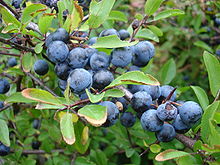sloe
Jump to navigation
Jump to search
English[edit]

Etymology[edit]
From Middle English slo, sla, sloo, from Old English slā, slāh, from Proto-West Germanic *slaihā, from Proto-Germanic *slaihǭ, *slaihwō, from Proto-Indo-European *(s)leh₃y- (“bluish”). Doublet of Sliwa.
Pronunciation[edit]
Noun[edit]
sloe (plural sloes)
- The small, astringent, wild fruit of the blackthorn (Prunus spinosa).
- 1796, Erasmus Darwin, Zoonomia, or, the Laws of Organic Life, part II.I.I.III:
- There is also a dryness in the mouth from the increased action of the absorbent vessels, when a sloe or a crab-apple are masticated...
- 1872, The Snow Queen by H. C. Andersen, translation by Paull:
- The dew-drops fell like water, leaf after leaf dropped from the trees, the sloe-thorn alone still bore fruit, but the sloes were sour, and set the teeth on edge. Oh, how dark and weary the whole world appeared!
- 1900, Leo Tolstoy, “Twelve Years before”, in Louise Maude, transl., Resurrection: A Novel, New York, N.Y.: Dodd, Mead & Company, →OCLC, book I, page 46:
- Katúsha, with her eyes black as sloes, her face radiant with joy, was flying towards him, and they caught hold of each other's hands.
- The tree Prunus spinosa.
- Any of various other plants of the genus Prunus, as a shrub or small tree, Prunus alleghaniensis, bearing dark-purple fruit.
Derived terms[edit]
Translations[edit]
fruit of Prunus spinosa
|
tree Prunus spinosa — see blackthorn
tree of the genus Prunus bearing dark-purple fruit
- The translations below need to be checked and inserted above into the appropriate translation tables. See instructions at Wiktionary:Entry layout § Translations.
Translations to be checked
Anagrams[edit]
Norwegian Nynorsk[edit]
Alternative forms[edit]
- sloa (verb, a-infinitive)
Etymology[edit]
Noun[edit]
sloe m (definite singular sloen, indefinite plural sloar, definite plural sloane)
- a bunch of branches or small trees that one drags after one self (to haul hey, sweep away snow, or used as a break)
- a lazy person, a good-for-nothing, a n'er-do-well
Verb[edit]
sloe (present tense sloar, past tense sloa, past participle sloa, passive infinitive sloast, present participle sloande, imperative sloe/slo)
- (transitive) to drag
- (intransitive) to be lazy
References[edit]
- “sloe” in The Nynorsk Dictionary.
Anagrams[edit]
Categories:
- English terms derived from Proto-Indo-European
- English terms derived from the Proto-Indo-European root *(s)leh₃y-
- English terms inherited from Middle English
- English terms derived from Middle English
- English terms inherited from Old English
- English terms derived from Old English
- English terms inherited from Proto-West Germanic
- English terms derived from Proto-West Germanic
- English terms inherited from Proto-Germanic
- English terms derived from Proto-Germanic
- English doublets
- English 1-syllable words
- English terms with IPA pronunciation
- Rhymes:English/əʊ
- Rhymes:English/əʊ/1 syllable
- English terms with homophones
- English lemmas
- English nouns
- English countable nouns
- English terms with quotations
- en:Prunus genus plants
- Norwegian Nynorsk terms inherited from Old Norse
- Norwegian Nynorsk terms derived from Old Norse
- Norwegian Nynorsk lemmas
- Norwegian Nynorsk nouns
- Norwegian Nynorsk masculine nouns
- Norwegian Nynorsk verbs
- Norwegian Nynorsk weak verbs
- Norwegian Nynorsk transitive verbs
- Norwegian Nynorsk intransitive verbs
